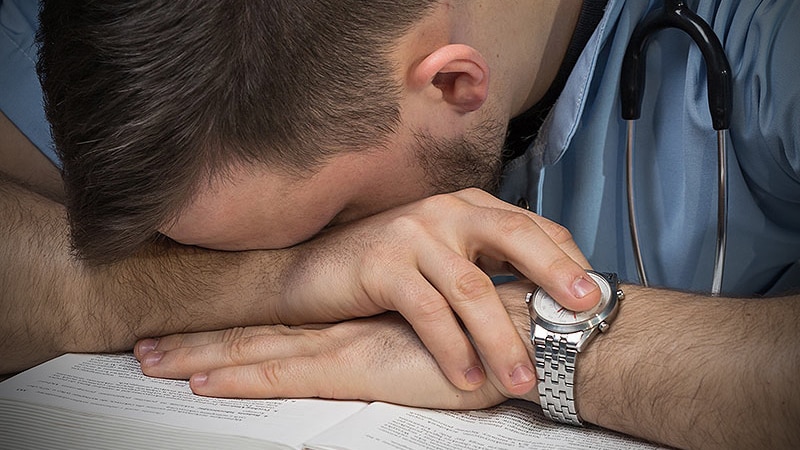I’d like to say we didn’t sign up for this, but oh yes we did.
We’re medical professionals and sleep deprivation is an uninvited guest who comes by to visit and overstays their welcome. Through one (maybe two) MCATs, three USMLE step exams, board exams (and for some, your oral board exams) — along with the goofy hours and crazy shifts that come with the job — we are well acquainted with sacrificing sleep to achieve our goals. We deal with life and death, and we flex to our respective workflows.
Everyone has their tricks to cope. Most seem universal. But in my experience, it’s not what you do, but how you do it. And self-knowledge is the key to it all.
In the effort to swim rather than sink from exhaustion, here are some fatigue-fighting tips I’ve learned over the years:
Exercise opportunistically. The thought of a full-blown workout after grinding for 12-24 hours is as welcome as an admission for dizziness in the last five minutes of a shift. But little bursts of movement when the fatigue creeps in? Critical. And time-friendly. I found taking the stairs from the ED in the basement to the penthouse call room was an easy opportunity for perk-me-up cardio. On a night shift with no one around, several sets of burpees were efficient between tasks (yes, everyone hates burpees, but boy do they work).
Not into cardio? Consider an intense session of breathing exercises or stretching which can increase relaxation and decrease blood pressure. (And John McClane in the movie Die Hard was right — making fists with your toes really can be like a cup of coffee.) The key here is not what you do but honing your ability to steal a few seconds or minutes to do something physical.
Nap thoughtfully. I remember the early morning hours of inpatient residency when I discovered the power of the perfect nap. I didn’t need a pillow or a duvet — just give me a sturdy surface and low light. But a nap can be a bear trap: 20 minutes could relaunch one person’s day and send another into the land of grog. You have to find the duration sweet spot that works just for you. (Just ask NASA — they assembled research for their fatigued pilots showing a 10-minute nap can improve performance, stabilize it, or have no effect at all. It all depends on the person.)
My experience: Shorter is sweeter. Yes, studies have shown 10-20-minute naps to be more restful than shorter naps of 5 minutes, but even if you have extra time, don’t get greedy or you risk sleep inertia, that feeling of being more tired post-nap. That impairs reaction time, information processing, and decision-making.
Use stimulants strategically. My usual caffeine consumption on day shift was one cup of coffee in the morning before or during sign-out. I know myself and if I were to drink caffeine after 12 noon, I could bet the farm I’d be up for the rest of the evening counting sheep (or patients). So I learned: Afternoon java was horrible for day shift but wonderful for transitioning to night shift duties.
Caffeine is a drug (cough, cough!), and doctors know how easily humans can reach for a drug even when they might not need it. Research shows low (40 mg) to moderate (300 mg) doses of caffeine can enhance cognitive and physical performance…but you really need to know yourself. Remember, 8 oz of coffee has about 95 mg of caffeine, and a 20-oz cup is available at just about any coffee counter. Pick your spots — and your amounts.
Eat sugarlessly. That’s not a word, but you know exactly what I mean. Full disclosure, when I’m stressed, candies, cookies, cakes, you name it, are my best friends. As a medical student and resident, I was a vending machine queen (I’m not proud of it). So how is it that trained medical professionals with full knowledge of how food and blood glucose intertwine fall into this trap?
Sometimes you just have to learn the hard way, and it wasn’t until I realized how this yo-yo cycle was affecting my abilities and mood that I started drinking more water during shifts and opting for healthy meals on a regular schedule. The large pockets of your white coats aren’t just for stethoscopes and tuning forks. Keep them stocked with nutritionally dense snacks. I like nuts, seeds, and bananas.
It’s true: An apple a day keeps the doctor awake.
In conclusion, I leave you with a scene from the movie Titanic. Not long after the ship sank, Rose and Jack languish in the sea on a large piece of wood. Rose lays atop the rudimentary raft while Jack hangs on the edge submerged in freezing cold water, trying to stay positive. The internet still debates whether there was room for both Rose and Jack if only Rose would have scooted over a bit.
I say: Rose is clinical fatigue, and we are the collective Jack, caught in the uncomfortable position of duty vs self. We need to hoist ourselves out of the frigid waters of self-sacrifice and lay claim to our side of the raft. Do we kick Rose off completely? No. We find balance and stability. We are not unsinkable, and a little compromise can go a long way.
Sophia O. Hammonds, MD is a family medicine practitioner in Columbus, Ohio affiliated with Ohio State University (OSU) Wexner Medical Center.
Source: Read Full Article
